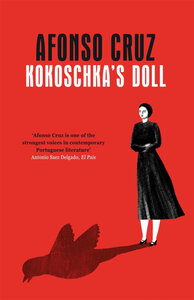Afonso Cruz, Kokoschka’s Doll (2010)
Translated from the Portuguese by Rahul Bery (2021)
I like it when a novel challenges me to work out why it takes the form that it does. Kokoschka’s Doll challenged me in that me. I kept mulling over such questions as: why is a third of it given over to a novel-within-a-novel of the same title, with pages tinted grey? Why does it go off on so many tangents, with characters who might (at first) seem disconnected? What’s the importance of the title, when the doll in question appears relatively briefly and late on?
Well, it took me until I had finished the book before I felt I had a handle on why Kokoschka’s Doll is the way it is. But it was never less than compelling for all that.
We begin in wartime Dresden. In a brief, harrowing passage, young Isaac Dresner runs away from a German soldier, and takes refuge in the cellar of a bird shop owned by one Bonifaz Vogel. When Vogel hears a voice coming from the floorboards, he assumes he’s hearing mice. But there’s a quiet authority in that voice, and in time Isaac comes to act as Vogel’s conscience. When he emerges from the cellar at war’s end, Isaac is both a son- and father-figure to Vogel, in different ways.
As an adult, Isaac has become a publisher. He meets an author named Mathias Popa, who writes a book called Kokoschka’s Doll which has several fluid layers of reality, including a version of Isaac Dresner as a character.
The novel’s title refers to the Austrian painter Oskar Kokoschka, who had a three-year romance with Alma Mahler (the composer’s widow). When the affair ended, Kokoschka remained so infatuated with Alma that he commissioned a life-size replica of her. The key point for this novel, I think, is that Kokoschka had his servant spread rumours about the doll as though it had its own social life – because the doll could only ever be considered ‘real’ if it had its own social reality, and other people to witness that.
This is what I take away as the main theme of Kokoschka’s Doll: that everyone’s connected, no one complete without other people. So, for example, Isaac’s voice helps complete Vogel as a person, and Vogel does the same for Isaacs. That’s why there’s no single, stable account of life for most of Cruz’s characters – because there isn’t a single, stable life to begin with.
The theme of interconnectedness comes together poignantly at the end. After this, I look forward to reading more by Afonso Cruz in the future.
Published by MacLehose Press.

28th January 2021 at 3:05 pm
This is a great review David, very perceptive. It was a pleasure to translate and I’m glad that it appears you enjoyed reading it too!
19th February 2021 at 4:30 pm
Thanks for your comment, Rahul! The book was indeed a pleasure to read – I’d love to see it make the International Booker.